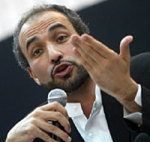 A group of academic and civil rights organisations has written to the Obama administration asking it to end U.S. visa refusals to foreign scholars apparently because of their political leanings.
A group of academic and civil rights organisations has written to the Obama administration asking it to end U.S. visa refusals to foreign scholars apparently because of their political leanings.
Probably the best known of these cases is that of Tariq Ramadan, the Swiss-born Islamic scholar who was just about to take up a chair at the University of Notre Dame in 2004 when a visa already issued to him was suddenly revoked. Ramadan is a leading Muslim intellectual in Europe with a strong following among young Muslims who like his message that they can be good European and good Muslims at the same time.
The American Civil Liberties Union will plead his case for lifting the ban before the U.S. Court of Appeals in New York on March 24. Given the way President Barack Obama has rolled back several policies of the preceding Bush administration, there could now be a chance that Washington will simply lift the ban and let Ramadan take up the many invitations to speak that he would probably get from U.S. universities and think tanks. That would be a victory for academic freedom, but it still leaves one question unanswered.
This official explanation has never sounded convincing and it always seemed Ramadan was being punished for his political views, which are left-wing, pro-Palestinian and critical of the Bush administration. I suspect there was something else going on behind the scenes, either a political decision made by administration officials or a direct intervention by someone or some body outside the administration who was opposed to letting him speak freely in the U.S. Ramadan himself has blamed Daniel Pipes, a controversial U.S. commentator on Islam who welcomed the ban. Other suggestions are French government officials or intellectuals who dislike the way he promotes a kind of Muslim pride and ensures religion remains a public issue.
If the Obama administration does lift the ban, let’s hope it goes all the way and publishes any Bush administration paperwork explaining it, so we can see a more convincing explanation for keeping him out of the United States.
Tom Henegan at FaithWorld, 19 March 2009
